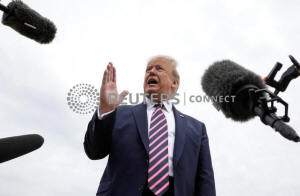Trump renews partisan pandemic commentary as Texas moves to further ease
shutdown
 Send a link to a friend
Send a link to a friend
 [May 06, 2020]
By Jeff Mason [May 06, 2020]
By Jeff Mason
PHOENIX (Reuters) - President Donald Trump
on Tuesday accused Democrats of hoping his coronavirus response fails
"so they can win the election," as the Republican governor of Texas
moved to further relax business shutdowns aimed at quelling the
pandemic.
Trump's latest partisan commentary on the public health crisis and
resulting economic meltdown engulfing his presidency came hours before
he visited a face-mask factory in Arizona, where he defied
infection-control guidelines by not wearing a mask himself.
At the plant, Trump said he planned to wind down the White House
coronavirus task force led by Vice President Mike Pence as the country
shifts into a new phase focusing on the aftermath of the outbreak.
"We can't keep our country closed for the next five years," Trump said,
when asked why it was time to wind down the task force.
He said two leading medical experts who have played prominent roles on
the task force - Dr. Anthony Fauci and Dr. Deborah Birx - would stay on
as advisers after the group was dismantled.

Fauci, the National Institute of Allergy and Infectious Disease director
who has at times openly contradicted Trump's assertions about the
pandemic, has become a lightning rod of scorn from the president's
supporters on the far right.
Before departing the White House, Trump was asked by a reporter why he
would allow Fauci to testify next week before a committee of the
Republican-controlled U.S. Senate but not the Democratic-majority House
of Representatives.
"Because the House is a setup. The House is a bunch of Trump haters,"
the Republican president answered. "They, frankly, want our situation to
be unsuccessful, which means death, which means death, and our situation
is going to be very successful."
Trump, who had staked his November re-election bid on a robust U.S.
economy before the pandemic struck, said Democrats "want us to fail so
they can win an election, which they're not going to win." He offered no
evidence to support his assertions.
Despite Trump's efforts to steer Fauci away from what the president sees
as hostile territory on Capitol Hill, a House panel will likely be the
next battleground in a separate controversy over the recent ouster of
the physician who led a U.S. biomedical agency.
Dr. Rick Bright filed a whistleblower complaint on Tuesday accusing the
Trump administration of removing him in retaliation for concerns he
tried to raise about the coronavirus threat in January. A spokeswoman
for Bright said he would testify before a House panel on May 14.
PANDEMIC RESPONSE POLITICIZED
Debate over how and when to ease restrictions on commerce and social
life have grown increasingly politicized, with Trump and his supporters
agitating to loosen social-distancing measures more swiftly than medical
experts deem prudent.
Democratic governors of states hardest hit by the outbreak have taken a
more cautious stance, abiding by public health officials - and
guidelines from the White House itself - warning that vastly expanded
coronavirus testing and other safeguards be put in place first.
[to top of second column]
|

President Donald Trump Trump talks to reporters prior to boarding
Air Force One as he departs Washington for travel to Arizona at
Joint Base Andrews, Maryland, U.S., May 5, 2020. REUTERS/Tom Brenner

But dozens of U.S. states, many led by Republicans in the South,
Midwest and mountain West, have begun in recent weeks ease
stay-at-home orders that have paralyzed their economies.
Texas, one of the largest, allowed restaurants, retail stores and
shopping malls to resume business on a limited basis last Friday. On
Tuesday Governor Greg Abbott, a Republican, announced he was
expanding that partial reopening to hair salons, barber shops and
nail parlors this Friday, to be followed by fitness clubs and office
buildings on May 18, subject to occupancy restrictions and workplace
social-distancing.
He also recommended individuals 65 and over, as well as people with
chronic health conditions, largely remain at home.
Widespread relaxation of social-distancing measures was a key factor
cited by an influential coronavirus mortality model on Monday in
predicting nearly 135,000 Americans would die from COVID-19 by early
August, almost double previous projections.
The research model from the University of Washington's Institute for
Health Metrics and Evaluation has become a closely watched data
point often cited by the White House and public health authorities
in gauging the coronavirus crisis.
The highly contagious virus, which emerged in China late last year
before spreading around the globe, already is known to have infected
more than 1.2 million people in the United States. At least 70,000
Americans have died from COVID-19, according to a Reuters tally.
In Arizona, marking his first trip in weeks beyond the greater
Washington area, Trump visited a Honeywell International Inc <HON.N>
aerospace facility in Phoenix that is making protective N95 face
masks for healthcare workers.
But the president, who has consistently declined to wear a mask in
public despite White House guidelines urging people to do so, showed
up at the facility without any face covering. Most of the workers
were wearing masks.
Arizona, a battleground state that could decide the election
outcome, has also joined the ranks of partial economic reopenings,
after protesters rallied in the capital Phoenix demanding Republican
Governor Doug Ducey loosen restrictions.

(Reporting by Susan Heavey, Jeff Mason and Steve Holland in
Washington, Nathan Layne in Connecticut, Brendan O'Brien in Chicago,
Brad Brooks in Austin, Texas, Rich McKay in Atlanta and Rajesh Kumar
Singh; writing by Grant McCool and Steve Gorman; editing by Frank
McGurty, Howard Goller, Cynthia Osterman and Gerry Doyle)
[© 2020 Thomson Reuters. All rights
reserved.] Copyright 2020 Reuters. All rights reserved. This material may not be published,
broadcast, rewritten or redistributed.
Thompson Reuters is solely responsible for this content. |